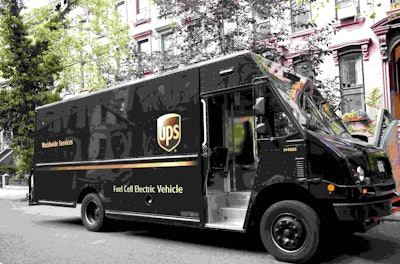
Range limitations and long charge times–these are two challenges in all-electric delivery vehicles that Ballard Power Systems is taking on through a partnership with CALSTART and UPS.
Ballard Power Systems announced today that it has signed a contract with CALSTART for a Ballard 30 kilowatt (kW) FCveloCity-MD fuel cell module to be used in a trial and development program involving UPS Class-6 delivery vans operating in California’s South Coast Air Basin, including much of the greater Los Angeles area.
Funding for the project is being provided by the South Coast Air Quality Management District (SCAQMD) as part of its efforts to reduce harmful air pollution.
“SCAQMD’s technology advancement programs have helped to ensure wide-scale deployment of low- and zero-emission heavy duty on-road technologies, including all classes of trucks and buses, to clean the air in the South Coast basin,” said Wayne Nastri, SCAQMD’s executive officer. “Greater deployment of fuel cell vehicles is expected to provide a reduction of pollutants, especially in disadvantaged communities that are disproportionately exposed to harmful diesel emissions.”
The range of current battery-powered Class-6 UPS delivery vans is only sufficient for a limited percentage of routes and often not for the majority of routes in a delivery area, according to Ballard. Compared to conventional vehicles, EV delivery vans have had a tougher time with heavier loads, hilly terrain or colder temperatures. Ballard’s fuel cell range extender system is designed to address these limitations by increasing range while maintaining zero-emission performance.
CALSTART’s primary goal for this project is to demonstrate the business case and technical feasibility of deploying fuel cell hybrid electric Class-6 vehicles with greater range capability such that UPS chooses to deploy up to 1,500 similar vehicles in its California fleet over the next 5-years – representing a significant percentage of UPS’s 8,000 California delivery vans – while also demonstrating the economic and technical potential of this technology to other operators of the states’ approximately 650,000 Class 4-to-7 vehicles.
“We are delighted to work with CALSTART to demonstrate the strong fit for our fuel cell module as a range extender in a UPS delivery van,” said Rob Campbell, Ballard chief commercial officer. “Particularly those UPS vehicles requiring longer range and operating for more hours during each day – in other words, delivery vans with high utilization rates – will benefit from a hybrid solution using Ballard’s FCveloCity-MD module. We also see rapid hydrogen refueling as a better alternative approach to long battery recharging times.”
John Boesel, President and CEO of CALSTART added, “We are very appreciative of the funding provided by the South Coast Air Quality Management District to develop, deploy, and test a new competitive zero-emission powertrain for the delivery truck market. Using a fuel cell as a range extender would enable an operator to cover almost all routes without any range anxiety.”
The program with UPS will use a 23,000 lb. Class-6 delivery van capable of speeds up to 65 miles per hour. The UPS van will be equipped with a 71kWh lithium ion battery and a 30kW Ballard fuel cell engine. Viewed as a replacement for an older diesel delivery van, this zero-emission configuration will deliver a net 24 metric ton reduction in greenhouse gases (GHGs) together with a 0.02 ton reduction in criteria pollutant emissions on an annual basis.
Partners for this program include South Coast Air Quality Management District, UPS, Complete Coach Works (CCW) and Unique Electric Solutions (UES).








